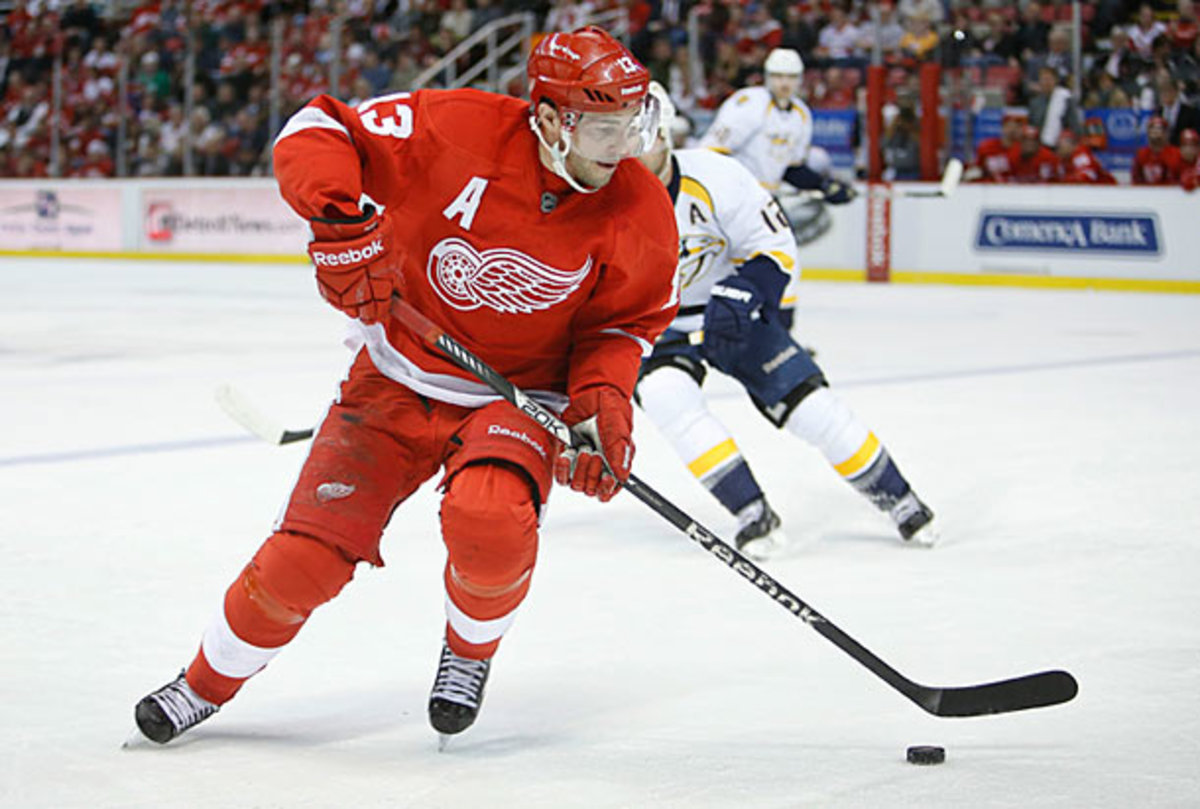Pavel Datsyuk's extension with Red Wings a new kick in the rubles for KHL
The KHL will have to wait until Pavel Datsyuk is 40 if it wants him as a marquee star. (Tom Szczerbowski/Getty Images)
By Allan Muir
Pavel Datsyuk may have been speaking from the heart when he talked about how much fun he had playing back home in Russia during the lockout. "This is my goal [to end my career in the KHL], but you never know how it goes," he said. "I would love to finish there, give back to my friends and fans in Russia [while] I hope I'll be in good shape."
But by the end of the season, he was coming from a much more pragmatic place when he voiced a wish to stay in Detroit. "Yeah, I hope we sign a new deal. I hope we agree and I sign for more [years]," he said as the Red Wings cleaned out their lockers.
And so it was no surprise when Datsyuk tweeted today that he'd come to terms on a three-year extension that will earn him $23 million and keep him with the Wings through the 2016-17 season.
It's a win for both sides. Datsyuk will be paid $10 million the first year, $7.5 million the second, and $5.5 million the third, with a cap hit of $7.5 million that's more than manageable for Wings and a fair payday for a player who led the team in scoring this past season. Big smiles all around.
But the expressions are a little more glum back in Russia, and not because, you know, it's Russia. Datsyuk's rejection is another slap in the face for the KHL, which had hoped to lure the future Hall of Famer back to the motherland to finish off his career at the end of next season, not when he's 40.
And this after the Russian league was rebuffed just last week by Evgeni Malkin, who signed an eight-year extension with the Penguins that will keep the former MVP in Pittsburgh until he's 35. The KHL had offered a sum that would have made him the highest-paid hockey player in history, but he settled for 60 cents on the dollar to stay in the NHL. That's the kind of rejection that leaves a mark.
"He's had these options for years," Malkin's agent, J.P. Barry, told a Pittsburgh radio station. "Last time he extended [in 2009], there was a contract on the table that was, I believe [10 years, $100 million] and he turned that down. This time, yes, there were offers out there in the range of $15 million...but he wants to play in the best league in the world and play with the best players and that was his decision."
Ok, so maybe Malkin, a superstar in full bloom, was a pipe dream. But a soon-to-be-35-year-old Datsyuk? If he's out of the KHL's reach, what hope does it have?
For all its big-league aspirations, the KHL remains a refuge for players who can't adjust to the culture or the game in North America (think Nikolai Zherdev and Alex Radulov) and those whose talents place them on the margins of the game, like Tomas Vincour and Chris Bourque, two fringe NHLers who signed today with Ak Bars Kazan rather than spend another season riding buses in the AHL.
But the gold standard players remain out of reach.
Not that the KHL will stop trying. Right now, SKA St. Petersburg is pursuing Vezina-winner Sergei Bobrovsky in an armored car loaded with tax-free rubles and a chance to play for Russia at Sochi. But the offer will be used as a bargaining chip and then rejected by a player who wants exactly what Datsyuk and Malkin want: to prove themselves against the best.

































